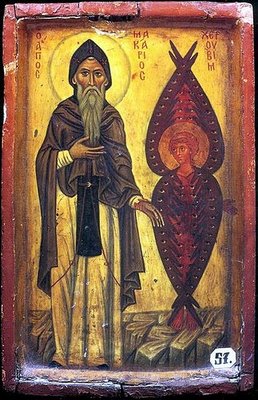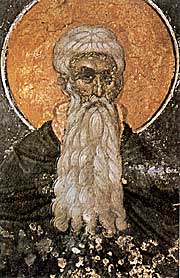Desert Fathers
Desert Fathers
The Desert Fathers were early Christian hermits, ascetics, and monks who lived mainly in the Scetes Desert of Egypt beginning around the third century AD. The most well-known among them were Anthony the Great, Paul of Thebes, and Pachomius the Great. They were pivotal in the development of Christian monasticism and their teachings and practices have had a lasting influence on Christian spirituality.
History[edit | edit source]
The movement began with Anthony the Great (c. 251–356 AD), who is often considered the founder of desert monasticism. He retreated to the desert to live a life of prayer, fasting, and manual labor. His example inspired many others to follow suit, leading to the establishment of a large community of hermits and monks in the Egyptian desert.
Teachings and Practices[edit | edit source]
The Desert Fathers emphasized a life of asceticism, which included practices such as fasting, prayer, and manual labor. They sought to live in solitude to achieve a closer relationship with God. Their teachings were often passed down through sayings and anecdotes, many of which were compiled in the Apophthegmata Patrum (Sayings of the Desert Fathers).
Influence[edit | edit source]
The Desert Fathers had a profound impact on the development of Christian monasticism. Their way of life and teachings influenced later monastic figures such as Benedict of Nursia, the founder of the Benedictine Order, and John Cassian, whose writings helped to spread the monastic ideals to the Western Church.
Notable Desert Fathers[edit | edit source]
Related Pages[edit | edit source]
- Christian monasticism
- Asceticism
- Apophthegmata Patrum
- Anthony the Great
- Paul of Thebes
- Pachomius the Great
- Scetes Desert
- Egyptian desert
Categories[edit | edit source]
This article is a Christianity-related stub. You can help WikiMD by expanding it!
Search WikiMD
Ad.Tired of being Overweight? Try W8MD's physician weight loss program.
Semaglutide (Ozempic / Wegovy and Tirzepatide (Mounjaro / Zepbound) available.
Advertise on WikiMD
|
WikiMD's Wellness Encyclopedia |
| Let Food Be Thy Medicine Medicine Thy Food - Hippocrates |
Translate this page: - East Asian
中文,
日本,
한국어,
South Asian
हिन्दी,
தமிழ்,
తెలుగు,
Urdu,
ಕನ್ನಡ,
Southeast Asian
Indonesian,
Vietnamese,
Thai,
မြန်မာဘာသာ,
বাংলা
European
español,
Deutsch,
français,
Greek,
português do Brasil,
polski,
română,
русский,
Nederlands,
norsk,
svenska,
suomi,
Italian
Middle Eastern & African
عربى,
Turkish,
Persian,
Hebrew,
Afrikaans,
isiZulu,
Kiswahili,
Other
Bulgarian,
Hungarian,
Czech,
Swedish,
മലയാളം,
मराठी,
ਪੰਜਾਬੀ,
ગુજરાતી,
Portuguese,
Ukrainian
Medical Disclaimer: WikiMD is not a substitute for professional medical advice. The information on WikiMD is provided as an information resource only, may be incorrect, outdated or misleading, and is not to be used or relied on for any diagnostic or treatment purposes. Please consult your health care provider before making any healthcare decisions or for guidance about a specific medical condition. WikiMD expressly disclaims responsibility, and shall have no liability, for any damages, loss, injury, or liability whatsoever suffered as a result of your reliance on the information contained in this site. By visiting this site you agree to the foregoing terms and conditions, which may from time to time be changed or supplemented by WikiMD. If you do not agree to the foregoing terms and conditions, you should not enter or use this site. See full disclaimer.
Credits:Most images are courtesy of Wikimedia commons, and templates, categories Wikipedia, licensed under CC BY SA or similar.
Contributors: Prab R. Tumpati, MD





